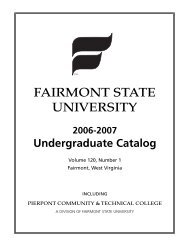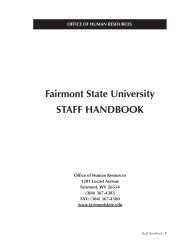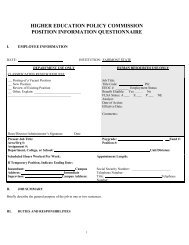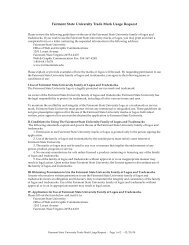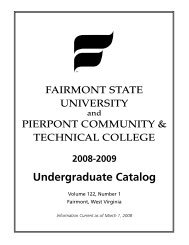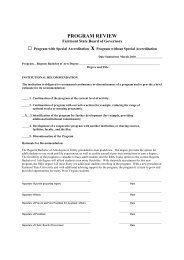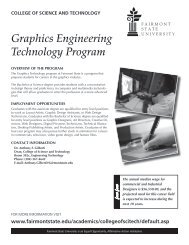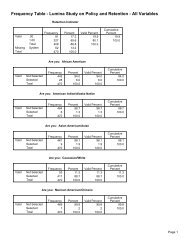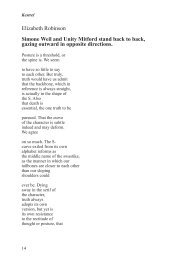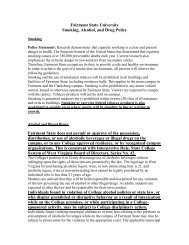Faculty Handbook - Fairmont State University
Faculty Handbook - Fairmont State University
Faculty Handbook - Fairmont State University
Create successful ePaper yourself
Turn your PDF publications into a flip-book with our unique Google optimized e-Paper software.
Senate may direct the President of the Senate to invite the President of the <strong>University</strong> to present a<br />
rationale for the veto.<br />
Section 2. The presiding officer of the Senate shall not vote except in the case of a tie.<br />
Section 3. A written, secret ballot shall be used in all elections.<br />
Section 4. Any matter introduced in the Senate will be classified as either major or minor<br />
legislation. This classification will be made by the Executive Committee for items placed on the<br />
agenda and by the presiding officer for items introduced from the floor. However, a classification<br />
may be changed by a majority vote of the Senators present. An item classed as minor may be<br />
discussed, amended and disposed of at the meeting in which it is introduced. An item classed as<br />
major will require two meetings for final disposition.<br />
a. Discussion shall be terminated by a majority vote to pass the item to a "second reading"<br />
at the next meeting.<br />
b. At the next meeting (either regular or special), the item may be discussed, amended, and<br />
moved to final disposition.<br />
Section 5. A voice vote shall be used to decide all major items of business, unless a Senator requests<br />
a secret ballot.<br />
Section 6. On any matter before the Senate, a vote of two-thirds ( 2 / 3) of those Senators present<br />
shall be empowered to end debate.<br />
ARTICLE V. <strong>Faculty</strong> Senate Committees – Rules of General Application<br />
Section 1. Standing and ad hoc committees shall be established by the Senate as needed for the<br />
proper fulfillment of the functions as delegated to it by the <strong>Faculty</strong> of <strong>Fairmont</strong> <strong>State</strong> <strong>University</strong>.<br />
Section 2. All committees shall follow the Rules of General Application and the processes specific to<br />
the Committee provided in Article VI of these Bylaws. Ad hoc committees may have additional or<br />
different rules and processes, which are subject to Senate approval.<br />
Section 3. Each committee shall meet at least once each semester. Notice shall be provided to the<br />
President of the Senate by the Committee Chair if a committee does not satisfy this meeting<br />
requirement.<br />
Section 4. Notice of all regular meetings of committees shall be announced through the <strong>Faculty</strong><br />
Senate page of the <strong>Fairmont</strong> <strong>State</strong> <strong>University</strong> web site. Members of standing committees shall be<br />
notified of meeting dates electronically by the Committee Chair.<br />
Section 5. All committee meetings will be open to all interested persons, unless the committee<br />
determines a closed meeting is necessary to protect personal rights of privacy as provided for in<br />
WV Code §6-9A-4.<br />
Section 6. Each committee shall keep adequate records of committee business. Committee matters<br />
of general importance to the <strong>University</strong> shall be reported promptly to the President of the Senate<br />
who will notify the President of the <strong>Faculty</strong> Assembly when applicable.<br />
Section 7. At the close of each semester each committee shall send a report of its activities in<br />
writing to the Executive Committee of the Senate. Additional reports may be requested by the<br />
Senate at any time.<br />
17



